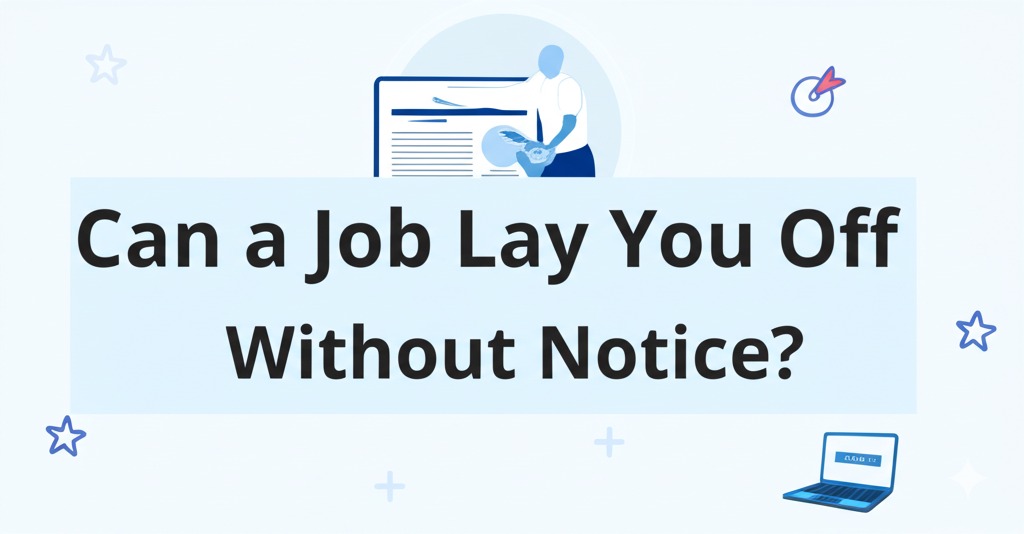
Losing a job unexpectedly can be a stressful experience, especially if it happens without warning. Many employees wonder whether an employer can lay them off without notice, and what their rights are in such a situation. The answer isn’t always straightforward, as it depends on several factors, such as your employment contract, company policies, and local labor laws. In this article, we’ll dive into the details of job layoffs, what notice requirements may apply, and how to handle the situation if you find yourself facing sudden unemployment.
What Does “Layoff Without Notice” Mean?
Before we discuss whether a job can lay you off without notice, it’s important to clarify what a layoff is. A layoff typically refers to the termination of employment due to business reasons, such as financial struggles, downsizing, or restructuring. Unlike termination for cause, a layoff is often not related to the employee’s performance.
A “layoff without notice” occurs when an employer ends your employment abruptly, without providing the standard notice period that might be outlined in your contract or by law.
Can an Employer Lay You Off Without Notice?
In most cases, whether an employer can lay you off without notice depends on various factors. Let’s break down the common scenarios in which this can happen.
1. At-Will Employment
In the United States, many employees are considered to be in “at-will” employment relationships. This means that either the employer or the employee can terminate the relationship at any time, for any reason, and with or without notice, unless there is a specific contract or collective bargaining agreement that states otherwise.
For example, if you work in an at-will state and your employer needs to downsize, they may not be required to give you notice before laying you off. This is why it’s crucial to understand your employment status before assuming that a layoff requires prior notice.
2. Contractual Employment
If you have a contract that specifies a certain notice period, your employer is typically bound by that agreement. In this case, they may not lay you off without providing the agreed-upon notice unless the contract is terminated for a specific reason, such as a breach of terms.
In contractual employment, the terms of your notice period can vary depending on what you and your employer have agreed upon. For instance, a contract may specify that either party must give two weeks’ notice before ending the employment relationship.
3. Unionized Employees
If you’re a unionized worker, the terms of your employment may be governed by a collective bargaining agreement (CBA). CBAs often include provisions on layoffs, including notice requirements. In some cases, union employees may be entitled to a certain notice period before a layoff can occur, and their employer must follow these terms strictly.
Employee Rights and Legal Protections
1. Labor Laws
Certain labor laws exist to protect employees from unfair treatment. For example, the Worker Adjustment and Retraining Notification (WARN) Act in the U.S. mandates that employers with 100 or more employees must provide 60 days’ notice of mass layoffs or plant closings, affecting 50 or more employees. If an employer fails to comply with this law, they may be required to pay affected employees for the 60-day period without notice.
However, it’s important to note that the WARN Act applies only to large employers, and there are exceptions, such as in cases of unforeseen business circumstances like natural disasters or financial crises. If you’re laid off under these conditions, the employer may not be required to give notice.
2. Severance Pay
In some cases, even if an employer can legally lay you off without notice, you may be entitled to severance pay. Severance packages are typically negotiated and can provide you with financial support during your job search. However, severance pay is not guaranteed by law in most places, so it depends on your contract or company policies.
What Should You Do If You’re Laid Off Without Notice?
Being laid off without notice can be disorienting and frustrating. If you find yourself in this situation, here’s a step-by-step guide to help you navigate the aftermath.
1. Review Your Employment Contract
Check your employment contract (if you have one) to see if there are any clauses regarding layoffs or notice periods. If the employer has violated the terms of the contract, you may be entitled to compensation or the remaining notice period.
2. Check Local Labor Laws
Look into your local labor laws to determine if there are any specific protections for layoffs in your region. Understanding these laws can give you leverage if you decide to pursue legal action or negotiate with your employer.
3. Contact Your Employer
While it may feel uncomfortable, reaching out to your employer for clarification is essential. Ask why the layoff occurred without notice and whether you’re entitled to severance or other compensation. Having a direct conversation may help resolve misunderstandings or open the door to negotiation.
4. Consider Legal Action
If you believe that your employer violated the terms of your contract or failed to comply with labor laws, consider seeking legal advice. An employment lawyer can assess your situation and advise you on your options, which may include filing a complaint or taking legal action.
5. Begin Your Job Search
While it’s important to address the legal aspects, it’s equally crucial to focus on your next steps. Start updating your resume, reach out to your professional network, and explore job opportunities. The sooner you begin your job search, the sooner you can transition to a new position.
Conclusion: Take Action and Protect Your Rights
In summary, whether an employer can lay you off without notice largely depends on your employment status, your contract, and local laws. While at-will employees may have limited protection, those with contracts or union agreements may have more rights regarding notice periods. If you’ve been laid off unexpectedly, review your contract, understand your legal rights, and take proactive steps to move forward with your career.
If you’ve experienced a layoff without notice, don’t hesitate to reach out to an employment lawyer or human resources to discuss your situation. Protecting your rights is the first step toward securing your financial stability and future employment.

Andre Cuevas provides career insights, job search strategies, and professional advice to help individuals navigate the job market and achieve their career goals.





